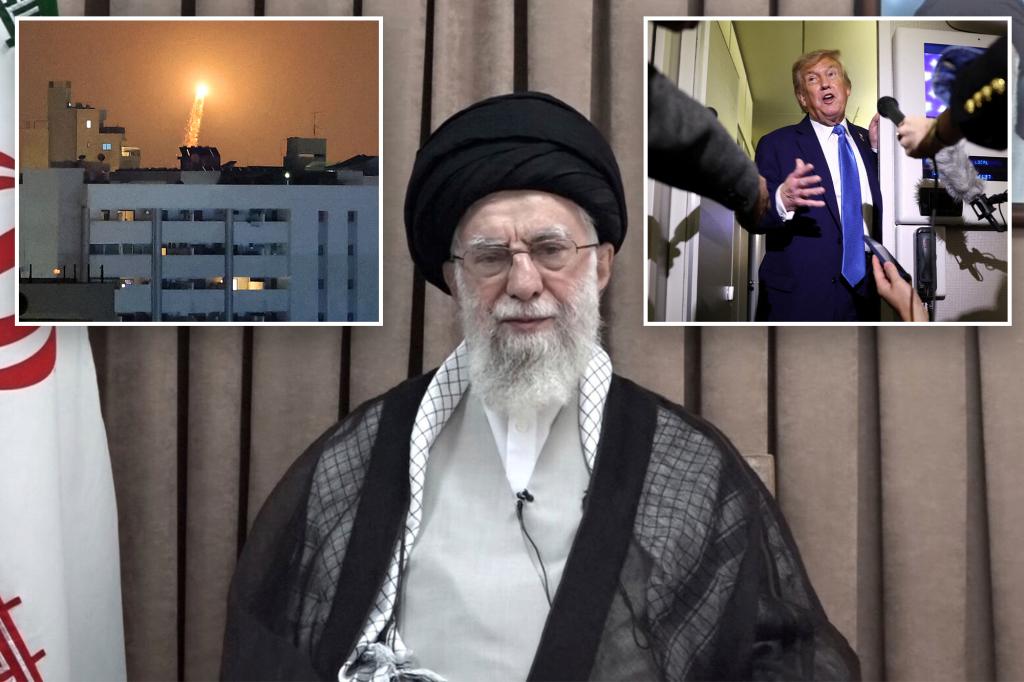
In a bold declaration on Wednesday, Iran’s Supreme Leader Ayatollah Ali Khamenei dismissed U.S. President Donald Trump’s demands for surrender, labeling him a “has-been warmonger.” The statement comes amid escalating tensions between Iran and the United States, intertwined with the ongoing conflict involving Israel.
Khamenei’s remarks were made in response to President Trump’s recent rhetoric, which included threats and demands for Iran to capitulate in its conflict with Israel. “The US President threatens us. With his absurd rhetoric, he demands that the Iranian people surrender to him. They should make threats against those who are afraid of being threatened. The Iranian nation isn’t frightened by such threats,” Khamenei stated on X, formerly known as Twitter.
Iran’s Defiant Stance
Ayatollah Khamenei further asserted that Iran would not back down and warned that any U.S. military action would result in “serious irreparable consequences.” He criticized the United States’ involvement in the region, suggesting that it would ultimately harm American interests more than Iran’s.
“The US entering in this matter is 100% to its own detriment. The damage it will suffer will be far greater than any harm that Iran may encounter,” Khamenei declared.
The Iranian government, facing dwindling missile supplies, responded to Trump’s assertions with a mix of defiance and disdain. Iran’s mission to the United Nations refuted claims of seeking negotiations with Washington, stating, “No Iranian official has ever asked to grovel at the gates of the White House.”
Escalating Rhetoric and Regional Implications
The exchange of threats and insults between Tehran and Washington highlights the volatile nature of the current geopolitical climate. President Trump, in a post on Truth Social, claimed knowledge of Khamenei’s whereabouts, hinting at potential military actions while emphasizing a desire to avoid civilian casualties.
“We know exactly where the so-called ‘Supreme Leader’ is hiding. He is an easy target, but is safe there – We are not going to take him out (kill!), at least not for now,” Trump stated.
This development follows a surprise attack by Israel, which has further complicated the situation. While initially distancing himself from the attack, Trump has recently expressed ambitions for a resolution beyond a mere ceasefire between Israel and Iran.
Historical Context and Expert Opinions
The current tensions between the U.S. and Iran are reminiscent of past confrontations, notably the 1979 Iranian Revolution and the subsequent hostage crisis, which have left a lasting impact on U.S.-Iran relations. Experts suggest that the rhetoric from both sides could lead to unintended escalations.
“The Iranian leadership has historically responded to threats with defiance, a pattern that dates back decades,” noted Dr. Sarah Alavi, a Middle East analyst. “The U.S. needs to consider the long-term implications of its rhetoric and actions in the region.”
Meanwhile, Iranian foreign ministry spokesman Esmail Baghaei warned that any American intervention could escalate into a broader conflict. “Any American intervention would be a recipe for an all-out war in the region,” he told Al Jazeera.
Looking Ahead: Potential Consequences
The ongoing war of words raises concerns about the potential for military confrontation. With thousands of American troops stationed in nearby countries, the risk of escalation remains high, posing a threat to regional stability.
As both nations continue to exchange threats, the international community watches closely, urging restraint and diplomacy. The situation underscores the need for a nuanced approach to Middle Eastern geopolitics, where historical grievances and contemporary conflicts intersect.
The world now waits to see whether cooler heads will prevail, or if further provocations will lead to an irreversible path toward conflict.






